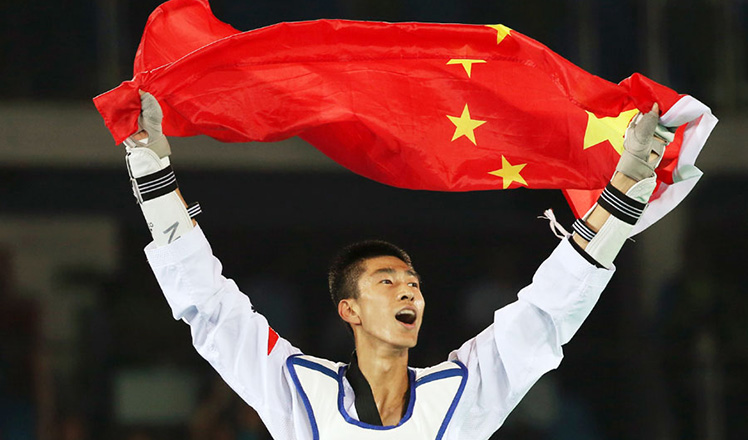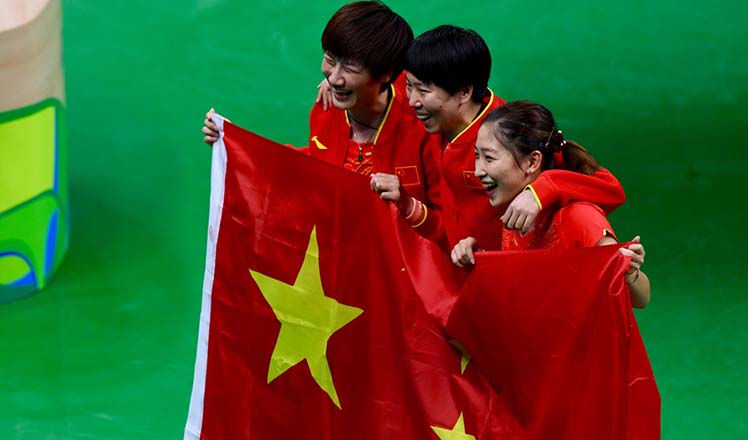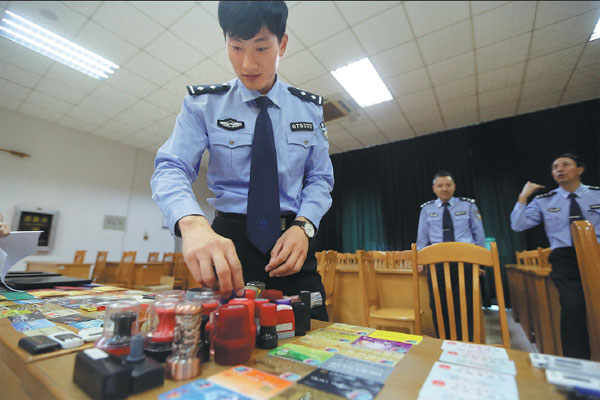China strengthens efforts to clean up 'dirty money'
Updated: 2016-08-17 07:36
By Wang Yanfei(China Daily)
|
||||||||
|
A police officer checks bank cards and plastic stamps confiscated during a crackdown on underground banks in Shenzhen, Guangdong province, in November. She You / For China Daily |
The nation's financial authorities are tackling money laundering by improving the mechanisms used to track suspect flows of funds. Wang Yanfei reports.
Yan Feng (not his real name) used to operate a small store that sold liquor and snacks on a street near the ferry port in Shenzhen, Guangdong province.
Although the store appeared no different to any other outlet in the business-dominated city, which stands adjacent to Hong Kong and was the site of China's first Special Economic Zone, close acquaintances knew the family used the premises as a front for a well-developed underground bank.
For a year, Yan and his family helped clients to move amounts far in excess of the annual $50,000 foreign currency limit to regions outside the mainland, including Hong Kong and Macao, which have no currency restrictions.
Acting on Yan's instructions, clients transferred money to bank accounts under his control. Once the deposit had been made, Yan's accomplices in Hong Kong placed an equivalent amount in a local bank using Hong Kong dollars. The client was then able to transfer the money to an account of their choice anywhere in the world, but to all intents and purposes no irregular transaction had taken place.
Yan was just one of many "black bankers" in China's coastal regions who offer quick fund-transfer services and move hundreds of millions of dollars out of the country every day. Although no official figures are available, unconfirmed estimates claim about $10 billion is laundered through China every year, mostly via outbound transactions.
Growing concerns
As key components in the money laundering sphere, the activities of underground banks have become a growing concern for China's financial institutions in recent years, and their success has raised questions about the lack of regulations to combat the practice.
"Foreign complaints about Chinese money laundering are not new, but some complainants have exaggerated the situation," said Jin Luo, director-general of the anti-money laundering bureau at the People's Bank of China, the nation's central bank.
- Malaysian authorities say ship carrying diesel hijacked
- Army commander: THAAD would 'easily affect' China-US ties
- Twin panda cubs confirmed born in Vienna zoo
- Four killed in boat collision in Greece
- Premier Li to receive Aung San Suu Kyi
- S Korean president names 3 new ministers for partial reshuffle

 Zhao wins China's first gold medal in men's taekwondo
Zhao wins China's first gold medal in men's taekwondo
 World's top 10 innovative economies
World's top 10 innovative economies
 Dancing, food and religion, all in a Xinjiang wedding
Dancing, food and religion, all in a Xinjiang wedding
 Men's table tennis overcomes singles loss to win team event
Men's table tennis overcomes singles loss to win team event
 China edges Brazil in volleyball quarterfinals
China edges Brazil in volleyball quarterfinals
 China's women's table tennis team sweeps gold
China's women's table tennis team sweeps gold
 Artists build sand sculptures to greet upcoming G20
Artists build sand sculptures to greet upcoming G20
 Top 10 biggest auto makers of 2015
Top 10 biggest auto makers of 2015
Most Viewed
Editor's Picks

|

|

|

|

|

|
Today's Top News
Trump outlines anti-terror plan, proposing extreme vetting for immigrants
Phelps puts spotlight on cupping
US launches airstrikes against IS targets in Libya's Sirte
Ministry slams US-Korean THAAD deployment
Two police officers shot at protest in Dallas
Abe's blame game reveals his policies failing to get results
Ending wildlife trafficking must be policy priority in Asia
Effects of supply-side reform take time to be seen
US Weekly

|

|










